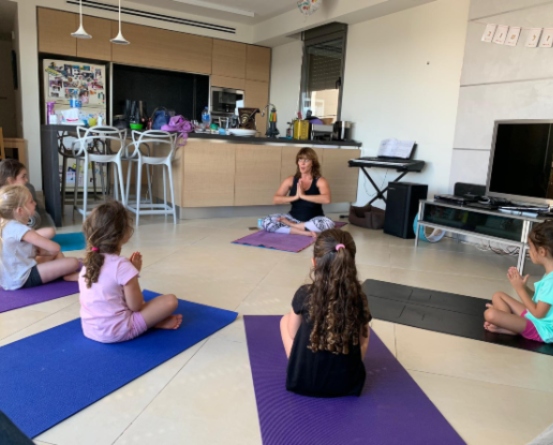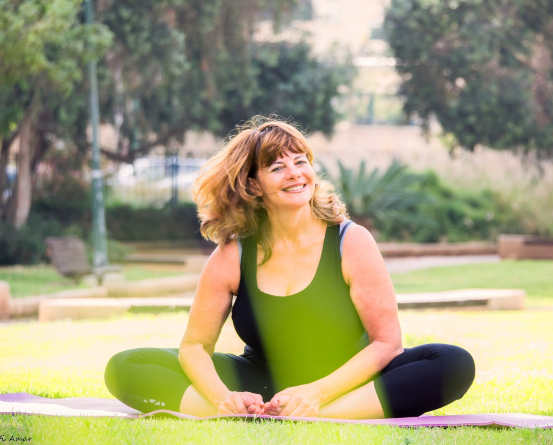Yoga for Enhanced Intuition, Improved Creativity and Improved Decision-Making Abilities

Yoga for Improved Brain Function and Flexibility
4 בSeptember 2022
Why Practice Yoga at the Beach?
16 בOctober 2022
Yoga for Enhanced Intuition, Improved Creativity and Improved Decision-Making Abilities
In addition to the many physical benefits of yoga (See article: “The Benefits of Yoga”), many scientific studies indicate that the practice of yoga and meditation affect the mind, improve our intuition, creativity and decision-making ability.
Throughout history and in contemporary times, scientists, world leaders and many famous people have embraced yoga as a way to nurture their mind and body, and improve their overall well-being.
Here are some examples:
* Albert Einstein: The iconic physicist known for his groundbreaking theories and contributions to science was a devotee of yoga, finding solace and inspiration in its practice.
* Isaac Newton: The father of modern physics and mathematics also practiced yoga to stimulate his mind and maintain mental clarity.
* Carl Jung: the renowned Swiss psychiatrist and psychoanalyst studied yoga and meditation as tools for self-exploration and personal growth.
* Barack Obama: The former President of the United States has spoken publicly about incorporating yoga and meditation into his daily routine to manage stress and stay focused.
* Steve Jobs: the visionary founder of Apple found inspiration and creative insights through yoga and mindfulness practices.
* Oprah Winfrey: The media tycoon and philanthropist attributes her success to a consistent yoga practice, which helped her maintain balance and concentration.
* Jennifer Aniston: The acclaimed actress and advocate for healthy living incorporates yoga into her fitness regimen for mental and physical well-being.
* David Ben-Gurion: The founding father of the State of Israel practiced yoga to find inner peace amidst the complexities of building the nation.
They all testify that the practice helped in calming the mind, clear thinking, improving concentration, focus, increasing creativity and helped in making decisions.
Why is so?
How does yoga help in listening to intuition and increasing the ability to make decisions and increasing creativity?
Here are some fascinating scientific findings found in studies conducted on this topic:
1.Strengthening the brain by increased activity of the frontal lobe in the brain:
In yoga we practice meditation both during the physical practice, where we practice meditative movement led by the breath, and at the end of the physical practice.Meditation is a practice that involves focusing the mind and cultivating a state of mental clarity, inner peace and heightened awareness by directing attention to a particular object, thought or activity, and being present in the present moment without judgment or attachment to thoughts and feelings.
Various scientific studies have found that meditation increases activity in the pre-frontal cortex, the part of the brain associated with executive functions such as decision-making, concentration and self-awareness.
This phenomenon creates the ideal environment for the emergence of intuitive insights.
A study conducted by Lazar et al. (2005) from Harvard Medical School found that among people who practiced meditation for a long time, regions of the prefrontal cortex were significantly thicker compared to those who did not practice meditation.
The thicker prefrontal cortex observed in the people who practiced meditation over time indicates that meditation may contribute to improved decision-making, concentration, improved self-awareness and other executive functions related to the prefrontal cortex.
This study found that practicing meditative yoga in general and meditation in particular on a regular basis can improve the executive functions of the brain and improve decision-making abilities.
Lazar, S. W., Kerr, C. E., Wasserman, R. H., Gray, J. R., Greve, D. N., Treadway, M. T., ... & Fischl, B. (2005). Meditation experience is associated with increased cortical thickness. Neuroreport, 16(17), 1893-1897.
2. Quieting the mind through reduced activity of the DMN network in the brain:
The DMN (Default Mode Network) is a network of brain regions that is active when a person is at rest and is not engaged in any specific cognitive or sensory tasks and is related to self-thinking, mind wandering and introspection.During the practice of yoga and meditation, the activity in the DMN network tends to decrease, and as a result the mind is quieter and distractions are reduced, which allows an increase in intuitive thinking and a decrease in cognitive thinking.
A study by Brewer et al. (2011) found increased activation in the dorsolateral prefrontal cortex (DLPFC), an area associated with attention control and maintaining focus, during a meditation task.
The task was to concentrate and focus on breathing.
The subjects who experienced meditation demonstrated increased activation in the prefrontal cortex (DLPFC) during meditation compared to the control group who did not practice meditation.
The increased activation in the DLPFC observed in subjects experienced in meditation indicates that meditation can modulate DMN activity.
This study provides scientific evidence supporting the idea that meditation affects the activity of the DMN network.
The increased activation in the DLPFC during meditation tasks points to a mechanism by which meditation can quiet the mind, reduce self-referential thinking, and promote present moment awareness.
When the mind is calm, it is possible to be more attentive to intuition, subtle and non-linear thoughts and insights, thus increasing creativity and the ability to make intuitive decisions.
Brewer, J. A., Worhunsky, P. D., Gray, J. R., Tang, Y. Y., Weber, J., & Kober, H. (2011). Meditation experience is associated with differences in default mode network activity and connectivity. Proceedings of the National Academy of Sciences, 108(50), 20254-20259.
3.Enhanced Emotional Regulation:
In yoga we practice mindfulness, a practice of directing attention to the experience of the present moment without evaluation which enables the cultivation of emotional awareness and self-regulation.A regular yoga practice fosters emotional stability, and enables emotional observation and understanding in a more objective way, without an emotional reaction. This emotional intelligence creates fertile ground for the flourishing of intuitive insights and more accurate decision-making.
Tang and colleagues (2007) conducted a study demonstrating the effect of mindfulness meditation training.
Participants who underwent mindfulness training demonstrated improved emotional regulation and reduced anxiety levels.
This indicates the profound effect of yoga-based practices on emotional well-being.
Tang, Y. Y., Ma, Y., Wang, J., Fan, Y., Feng, S., Lu, Q., ... & Posner, M. I. (2007). Short-term meditation training improves attention and self-regulation. Proceedings of the National Academy of Sciences, 104(43), 17152-17156.
4. Integration of Brain Hemispheres:
Meditative movement and meditation in yoga can balance the activity of the different hemispheres of the brain and thus create harmony between logical and intuitive ways of thinking.There is a more holistic and integrated processing of information that strengthens the connection to intuitive insights.
A study by Lee et al. (2012) investigated the effects of meditation on neural oscillations and found that meditation led to increased functional connectivity between brain lobes, which may create a balanced cognitive state and emotional well-being.
Lee, D. J., Kulubya, E., Goldin, P., Goodarzi, A., & Girgis, F. (2012). Review of the neural oscillations underlying meditation. Frontiers in neuroscience, 6, 63.
5. Heightened Theta and Alpha Brainwave Activity:
Yoga and meditation have been associated with increased theta and alpha brain wave activity.Theta waves are associated with deep relaxation, creativity and imagery, while alpha waves are associated with a relaxed yet alert state.
These brain wave patterns may create an optimal state for intuitive experiences, creative thinking and access to subconscious information.
A study by Cahn and Polich (2006) found that subjects who experienced meditation demonstrated increased theta and alpha power compared to those who did not experience meditation. The meditation caused more calmness and an increased capacity for creativity.
Cahn, B. R., & Polich, J. (2006). Meditation states and traits: EEG, ERP, and neuroimaging studies. Psychological Bulletin, 132(2), 180-211.
Another study conducted by Lagopoulos et al. (2009) used electroencephalography (EEG) to measure brain wave activity in people before and after an eight-week mindfulness meditation program.
The study found increased alpha and theta activity after the meditation training. The findings imply a transition to a calm and focused state.
Lagopoulos, J., Xu, J., Rasmussen, I., Vik, A., Malhi, G. S., Eliassen, C. F., & Arntsen, I. E. (2009). Increased theta and alpha EEG activity during undirected meditation. Journal of Alternative and Complementary Medicine, 15(11), 1187-1192.
In conclusion:
Scientific research indicates that yoga and meditation practices can enhance intuition, leading to improved creativity and decision-making abilities.
By increasing frontal lobe activity, reducing DMN activity, enhancing emotional regulation, promoting the integration of brain hemispheres, and inducing heightened theta and alpha brainwave activity, yoga provides a comprehensive framework for developing intuitive insights.
Incorporating yoga into our daily lives can offer a valuable tool for personal growth, improved cognitive abilities, and a deeper connection to our innate wisdom.
Yoga: Nurturing Body and Soul for a Fulfilling Life!
"Yoga is the journey back to yourself, when you dive deep inside, you connect to your inner voice that lights the way to self-discovery and clarity." ~ Unknown






